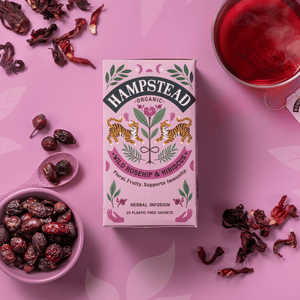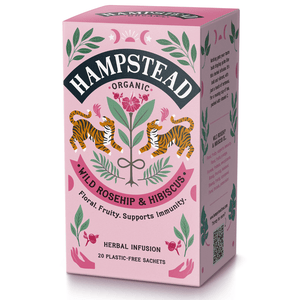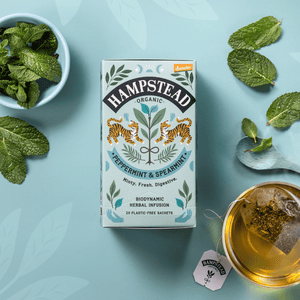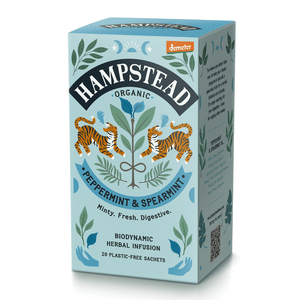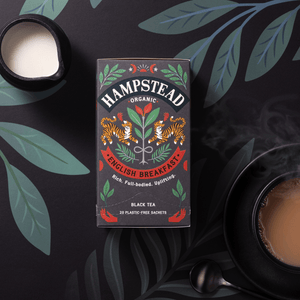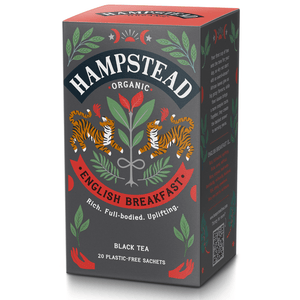What is Biodynamic Tea?
Most people have heard of organic agriculture (which all of our products are) but what about regenerative agriculture?
There has been much discussion in recent years around regenerative farming and its benefits, and it is something we have been passionate about from the beginning.
We believe that farming should be conducted in a way that contributes to the planet and its people instead of depleting it. That is why we prefer regenerative farming over conventional farming techniques. This type of regenerative farming we often refer to as Biodynamic.
Organic produces good returns, but regenerative farming (or biodynamic) can provide enormous long-term benefits. Let's look at the science behind it…
A More Thoughtful Way To Farm
Biodynamic is a term coined by Rudolf Steiner, who was an Austrian philosopher, scientist, architect and social thinker in the early 20th century. It's a way of growing crops that focuses on holistic farming practices that mimic natural cycles and patterns found in nature. This means using natural fertilisers instead of synthetic ones, crop rotation instead of monoculture farming methods, composting manure instead of applying chemical pesticides and herbicides.The calendar is an integral part of biodynamic farming. As part of this holistic approach to farming, farmers adhere to certain astrological phases throughout the year—with each phase dictating which crops are grown on which days in accordance with cosmic rhythms, for example harvesting on “Leaf Days” where plants focus on producing chlorophyll.
This approach to farming focuses on soil health, biodiversity, and carbon sequestration. It's not just about growing food—it's about being good stewards of the land that feeds us.
The result? A soil-building process so strong it improves our crops, ecosystems, biodiversity, and is one of the most important tools we have in the fight against climate change.
Regenerative Agriculture
Biodynamic farming is a type of regenerative agriculture. It aims to restore the health of the soil, plants, animals and humans through a holistic approach that recognises the interconnectedness of all life on earth.
Whereas other forms of sustainable agriculture seek to maintain systems without degrading them, regenerative farming applies management systems that restore the soil, transforming its health and vitality. The goal therefore for any biodynamic farm is to minimise external inputs; not stretch the land beyond its natural capacity; and for human activity to put back more than is taken out.
The aim goes beyond restoring the earth, it builds resilience and regeneration.

The Benefits of Biodynamic?
Soil health is the foundation of regenerative and biodynamic farming. Improving soil health is a catalyst for so many benefits for example;
- Biodynamic farming prohibits the use of pesticides, herbicides and GMOs, so neither the soil nor you have to ingest any harmful chemicals. It’s a more natural way of farming
- That leads to more nutrient-rich soil and more nutrients absorbed by plants (and ultimately in our food). In turn, this means we're getting more nutrients from the foods we eat!
- Improved water infiltration helps reduce runoff, which means less salt, phosphates and nitrates are washed into waterways. It also means that less fertiliser is needed, which has its own set of environmental impacts.
- It not only improves the health and diversity of life in the soil, but this goes above ground too, increasing biodiversity and wider benefits to the natural ecosystem.
- More carbon is captured in the soil (carbon sequestration) - keeping it out of the atmosphere where it can contribute to global warming. This means not only are these practices good for us today—they're good for future generations as well!
- Crops become hardier, making them less susceptible to drought and disease.

Makaibari - Our Biodynamic Tea Gardens
We are proud that our teas come from the Makaibari Tea Estate in Darjeeling, India. With the help of Hampstead Tea founder, Kiran Tawadey, it was the first tea garden ever to receive first organic certification, and then Biodynamic status in 1995.
For an estate or product to legally refer to itself as biodynamic, it must be certified by the industry and according to the Demeter International Standards. Makaibari was the first Demeter biodynamic tea garden in the world so it was quite pioneering and a very big step.
66% of the Makaibari Tea Estate is undisturbed rainforest where tea grows in harmony with the area’s natural ecological system. Tea bushes grow under jungle canopies, along with legumes, cloves and bamboo to name a few. Wild tigers roam the hills among exotic birds and flowers.
The farmers here support and nurture natural processes and recognise their interdependence. The aim of a Makaibari is not simply to maximize production at any cost, but to work like the conductor of an orchestra, allowing each element of the farm to both to thrive individually and to work in harmony with the others.
Increased yields, hardier crops, less use of chemicals and fertilisers means the economic benefits for these farmers are significant. With Makaibari also achieving Fairtrade status, this means many of the economic benefits are reinvested into the local communities, through education, female entrepreneurship, medical centers, new business and more. You can find out more about Makaibari’s Corporate Social Responsibility here.
The tea and ingredients we grow at Makaibari are used in the majority of our products. However, not all the ingredients we have can be certified biodynamic, simply because these farms do not exist yet. For example our organic Black Tea from Africa or the real organic bergamot oil in our Earl Grey teas. In these cases we always make sure they are 100% organic, and Fairtrade where possible.

So why go through all this trouble?
Well, because it makes a difference in how your tea tastes! It's also better for your health—you're consuming fewer chemicals and toxins that could harm your body. And last but not least, it's better for the environment: improved agricultural techniques and soil health has ample benefits to the Planet and thus the fight against climate change.
TO SUMMARISE, BIODYNAMIC TEA FARMING ENABLES:
- STRONGER CROPS TO HELP WITHSTAND CLIMATE, DISEASES ETC
- PROVEN TO REGULARLY PRODUCE HIGHER QUALITY NUTRIENT-RICH PLANTS, THAT KEEP FRESH LONGER, STORE BETTER, AND HAVE GREATER VITALITY.
- INCREASE CARBON SEQUESTRATION
- INCREASE BIODIVERSITY
- IS A WAY TO PUT MORE IN THAT YOU TAKE OUT FROM OUR PLANET
For more information also see https://www.biodynamic.org.uk


